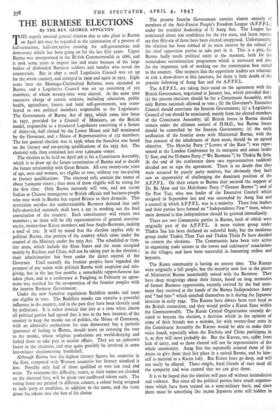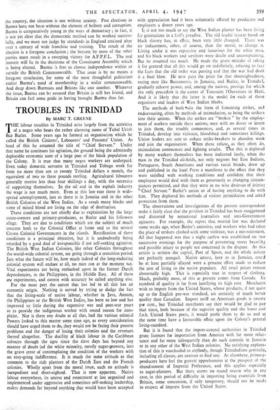THE BURMESE ELECTIONS
By THE REV. GEORGE APPLETON
THE eagerly awaited general election due to take place in Burma on April 9th may be regarded as the culmination of a process of half-conscious, half-instinctive training for self-government and democracy which has been going on for the last fifty years. Upper Burma was incorporated in the British Commonwealth in 1886, and it took some years to impose law and order because of the large bodies of disbanded Burmese soldiers and bandits who roved the countryside. But in 1897 a small Legislative Council was set up for the whole country, and enlarged in 1909 and again in 1915. Eight years later the Montagu-Chelmsford Reforms were extended to Burma, and a Legislative Council was set up consisting of 103 members, of whom seventy-nine were elected. At the same time executive charge of certain subjects, including education, public health, agriculture, forests and local self-government, was trans- ferred to two political members responsible to the Legislature. The Government of Burma Act of 1935, which came into force in 1937, provided for a Council of Ministers, on the British model, responsible to a bicameral Legislature consisting of a Senate of thirty-six, half elected by the Lower House and half nominated by the Governor, and a House of Representatives of 132 members. The last general election was in 1936, when the franchise was based on the literacy and tax-paying qualifications of the 1935 Act. The electoral rolls then contained just over r,000,000 voters.
The election to be held on April 9th is for a Constituent Assembly, which is to draw up the future constitution of Burma and to decide the future relationship with Great Britain. All over twenty-one years of age, men and women, are eligible to vote, without any tax-paying or literacy qualifications. The electoral rolls contain the names of about 7,000,000 voters ; thus most of those eligible will be voting for the first time. Only Burma nationals will vote, and not recent Indian or Chinese immigrants or British officials and business-people who may work in Burma but regard Britain as their domicile. This restriction satisfies the understandable Burmese demand that only fully-domiciled nationals shall have a say in working out the final constitution of the country. Each constituency will return two members ; so there will be 182 representatives of general constitu- encies, twenty-four Karen members and four Anglo-Burmans, making a total of 210. It will be noted that the election applies only to political Burma, that portion of the country which came under the control of the Ministry under the 1935 Act. The scheduled or fron- tier areas, which include the Shan States and the areas occupied mainly by Kachins and Chins, will not be taking part in the election ; their administration has been under the direct control of the Governor. Until recently the frontier peoples have regarded the prospect of any union with political Burma with suspicion and mis- giving, but in the last few months a remarkable rapprochement has taken place, and at a conference at Panglong in February an agree- ment was reached for the co-operation of the frontier peoples with the interim Burmese Government.
Under the new franchise regulations Buddhist monks and nuns- are eligible to vote. The Buddhist monks can exercise a powerful influence in the country, and in the past they have been cleverly used by politicians. It is rather ironical that just at a time when almost all political parties had agreed that it was in the best interests of the country to keep the monks out of politics, the House of Commons, with an admirable enthusiasm for true democracy but a pathetic ignorance of feeling in Ifurma, should insist on restoring the vote to the monks, whose religious professions are world-denying and forbid them to take part in secular affairs. They are an unknown factor in the situation, and may quite possibly be involved in some last-minute electioneering bombshell.
Although Burma has the highest literacy figures for countries in the East, compared with Western countries her literacy standard is low. Possibly only half of those qualified to vote can read and write. To overcome this difficulty, voters, as their names are checked on the electoral lists, will be given two cardboard tokens each. The voting boxes are painted in different colours, a colour being assigned to each party or candidate, in addition to the name, and the voter drops his tokens into the box of his choice. -The present Interim Government consists almost entirely of members of the Anti-Fascist People's Freedom League (A.F.P.F.L.) under the youthful leadership of U Aung-San. The League has
nominated about 200 candidates for the 210 seats, and latest reports say that fifty-six of these have been elected unopposed. Unfortunately, the election has been robbed of its main interest by the refusal of
the chief opposition parties to take part in it. This is a pity, for Burma badly needs political unity at the moment, both for the tremendous reconstruction programme which is necessary and also for the important task of working out the constitution best suited to the country. One suspects that the opposition leaders are reluctant to risk a show-down at this juncture, for there is little doubt of the popular following of Aung San and the A.F.P.F.L.
The A.F.P.F.L. are taking their stand on the agreement with the British Government, negotiated in January last, which provided that : (a) the present elections should be for a Constituent Assembly, with only Burma nationals allowed to vote ; (b) the Governor's Executive Council should constitute the Interim Government; (c) a Legislative Council of too should be nominated, mainly from the elected members of the Constituent Assembly; (d) British forces in Burma should remain under the ultimate control of H.M.G., but Burma forces should be controlled by the Interim Government; (e) the early unification of the frontier areas with Ministerial Burma, with the free consent of the inhabitants of these areas, should be an agreed objective. The Myochit Party ("Lovers of the Race ") was repre- sented at the London Conference by its energetic and astute leader U Saw, and the Dobama Party (" We Burmans ") by Thakin 13a Sein. At the end of the conference these two representatives suddenly decided not to sign the agreement. There is no doubt that they were actuated by purely party motives, but obviously they both saw an opportunity of challenging the dominant position of the A.F.P.F.L. On their return to Burma they secured the support of Dr. Ba Maw and his Mahabama Party (" Greater Burma ") and of Sir Paw Tun, who was leader of the Executive Council which resigned in September last and was succeeded by Aung San and a council in which A.F.P.F.L. was in a majority. These four leaders and their parties have formed an "Independence First" front, whose main demand is that independence should be granted immediately.
There are two Communist parties in Burma, both of which were originally part of the A.F.P.F.L. A more violent group under Thakin Soe has been declared an unlawful body, but the moderate group under Thakin Than Tim and Thakin Them n Pe have decided to contest the elections. The Communists have been very active in organising trade unions in the towns and cultivators' associations in the villages, and have been successful in fomenting strikes and boycotts.
The Karen community is having an uneasy time. The Karens were originally a hill people, but the majority now live in the plains of Ministerial Burma inextricably mixed with the Burmese. They have deep misgivings about their future, based on long memories of former Burmese oppressions, recently revived by the bad treat- ment they received at the hands of the Burma Independence Army and "bad hats" which attached themselves to it during the Japanese invasion in early 1942. The Karens have always been very loyal to the British connection, and they would prefer a Karen State within the Commonwealth. The Karen Central Organisation recently de- cided to boycott the election, a decision which in the opinion of sortie of their friends was a mistake, for with twenty-four seats in the Constituent Assembly the Karens would be able to make their voice heard, especially when the Kachins and Chins participate in it, as they will most probably do. But the Karens, too, suffer from lack of unity, and so those elected will not be representative of the whole community. Aung San has repeatedly assured them of his desire to give them their fair place in a united Burma, and he him- self is married to a Karen lady. But Karen fears go deep, and will not easily be allayed. These simple, loyal, friends of ours need all the sympathy and wise counsel that we can give them.
It is to be hoped that the election will pass off without intimidation and violence. But since all the political parties have youth organisa- tions which have been trained on a semi-military basis, and since there must be something like to,000 Japanese arms still hidden in the country, the situation is not without anxiety. Past elections in Burma have not been without the element of bribery and corruption. Burma is comparatively young in the ways of democracy ; in fact, it is not yet clear that the democratic method can be worked success- fully, and we must not judge by standards in England attained after over a century of wide franchise and training. The result of the election is a foregone conclusion ; the boycott by most of the other parties must result in a sweeping victory for A.F.P.F.L. The real interest will lie in the decisions of the Constituent Assembly which is being elected. Burma is free to choose independence within or outside the British Commonwealth. That issue is by no means a foregone conclusion, for some of the most thoughtful politicians realise Burma's need of membership in a wider commonwealth. And deep down .Burmans and Britons like one another. Whatever the issue, Burma can be assured that Britain is still her friend, and Britain can feel some pride in having brought Burma thus far.



































 Previous page
Previous page